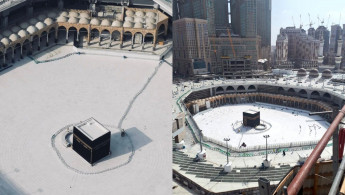Coronavirus apocalypse: For first time in millennia, photos show Islam's holiest site Mecca 'completely deserted'
State television relayed stunning images of an empty white-tiled area surrounding the Kaaba – a large black cube structure inside Mecca's Grand Mosque, which is usually packed with tens of thousands of pilgrims.
The images shocked Muslims around the world, many of whom will never have seen the Kaaba completely deserted.
The move was a "temporary preventive measure" but the upper floors of the Grand Mosque were still open for prayers, a Saudi official told AFP.
He called the measure "unprecedented".
The mosque will also close an hour after the evening prayer and reopen an hour before dawn to prevent the spread of infection, Lebanon Files reported.
On Wednesday, the kingdom halted the Umrah pilgrimage for its own citizens and residents.
|
Saudi Arabia on Thursday declared three new coronavirus cases, bringing the total number of reported infections to five.The move came after authorities last week suspended visas for the Umrah and barred citizens from the six-nation Gulf Cooperation Council from entering Mecca and Medina.
The Umrah, which refers to the Islamic pilgrimage to Mecca that can be undertaken at any time of year, attracts millions of Muslims from across the globe annually.
The decision to suspend the Umrah comes ahead of the holy fasting month of Ramadan starting in late April, which is a favoured period for pilgrimage.
It is unclear how the coronavirus will affect the hajj, due to start in late July.
Some 2.5 million faithful travelled to Saudi Arabia from across the world in 2019 to take part in the hajj, which is one of the five pillars of Islam as Muslim obligations are known.
The event is a massive logistical challenge for Saudi authorities, with colossal crowds cramming into relatively small holy sites, making attendees vulnerable to contagion.
Saudi Arabia has been implementing a variety of measures in attempt to stay on top of the viruses spread.
At the end of February, the kingdom said the grounds of the Grand Mosque in Mecca would be washed and sterilised four times a day as part of a "deep clean" to ensure the safety of pilgrims and visitors.
Over 13,500 thousand prayer rugs will also be removed daily for washing and sterilisation, the General Presidency for the affairs of the Grand Mosque and the Prophet's Mosque said.
Follow us on Facebook, Twitter and Instagram to stay connected





 Follow the Middle East's top stories in English at The New Arab on Google News
Follow the Middle East's top stories in English at The New Arab on Google News

![Israeli forces ordered bombed Gaza's Jabalia, ordering residents to leave [Getty]](/sites/default/files/styles/image_330x185/public/2176418030.jpeg?h=a5f2f23a&itok=_YGZaP1z)
